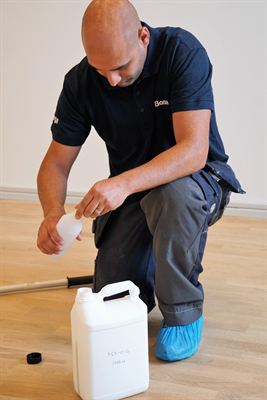Environmentally friendly and renewable: StepOn - the future floor varnish is made of sugar

Recently, it was premier for the bio-based floor varnish StepOn, with application on one of the wooden floors at Lund University, Sweden. The sugar-based surface layer is the first new result with commercial potential from the Mistra-funded research program STEPS (Sustainable Plastics and Transition Pathway).
The researchers at Lund University have developed a sugar based building block, as product developer at the company Bona AB used to produce a waterborne polyurethane dispersion. With this as a starting point a floor varnish was manufactured, a product with excellent scratch resistance and chemical resistance.
"We have developed a molecule that is suitable for, among other things, manufacturing of polyurethanes. In a short period of time, we have managed to produce material in such quantity and quality that Bona has been able to develop a possible consumer product ", says Professor Rajni Hatti-Kaul, STEPS Program Manager.
After just ten months of work, STEPS now tests its first demonstration product based on renewable raw materials and with an environmental profile that fits into the circular society of the future. Sustainability is an important driving force for Bona AB, where the new demonstration product StepOn reflects continuous work on durability and a powerful innovation initiative.
"In addition to the environmental benefits of renewable raw materials, we expect a longer durability of this wear layer. The ambition is to maintain the new look of the floor for a longer time. In this way, we save materials for renovation and reduce the consumption of wood to the floor itself", says Nicola Rehnberg, who is responsible for Bona's academic contacts.
In parallel with the fructose-based product, researchers are investigating if similar building blocks can be extracted from lignin, i.e. forest raw material.
About STEPS
The research program STEPS (Sustainable Plastics and Transition Pathway), with a strong support from important stakeholders, has a vision of a future society where plastics are developed, produced, used and recycled in a circular economy. This requires a transition to renewable raw materials along with increased reuse and recycling of plastics.
STEPS aims to play a key role in inspiring and accelerating this sustainability by strengthening the knowledge and research base for technology- and product development and innovation, by developing and evaluating key niche products with industrial partners. We also analyze sustainability, institutional and policy implications of potential transition pathways.
STEPS is a cross-border collaboration covering the entire value chain - from academia and industry to major brand owners and other key actors in the society.
The program is funded by Mistra (The Foundation for Environmental Strategic Research).
Rajni Hatti-Kaul, Lund University rajni.hatti-kaul@biotek.lu.se
Nicola Rehnberg, Bona AB Nicola.Rehnberg@bona.com


